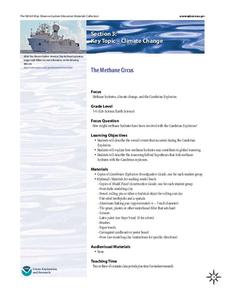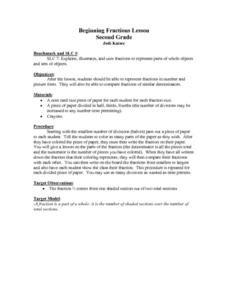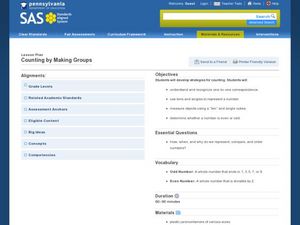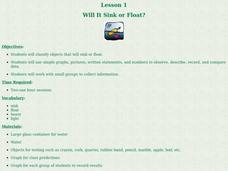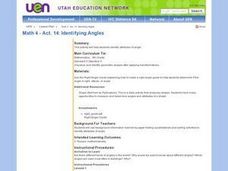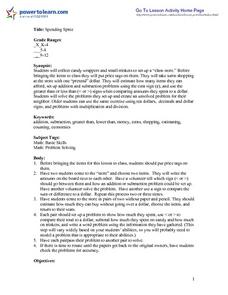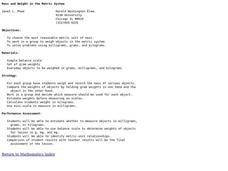Mathematics Vision Project
Module 6: Trigonometric Functions
Create trigonometric functions from circles. The first lesson of the module begins by finding coordinates along a circular path created by a Ferris Wheel. As the lessons progress, pupils graph trigonometric functions and relate them to...
Physics Classroom
Recognizing Forces
A common complaint among physics scholars studying Newton's laws of motion concerns drawing free-body diagrams. To practice the required pre-requisite skills for free-body diagrams, individuals identify which forces act in specific...
Teach Engineering
Let's Get it There Fast
Are planes the best shipping method? Using maps, pupils determine the fastest mode of transportation between two cities. Given a list of items to ship, groups decide the best shipping method to finish the 18th segment of a 22-part unit.
American Museum of Natural History
Trip Up Your Brain
Sometimes different parts of the brain disagree. See what this disagreement looks like using a remote learning resource to experience how brains often take shortcuts. Pupils complete the activity, observe their results, and then read...
University of Colorado
Space Travel Guide
Neptune takes 164.8 Earth years to travel around the sun. In the fifth of 22 lessons, young scientists create a travel guide to a planet in our solar system. They provide tips for others on what to bring, what they see, and their...
Teach Engineering
Buoyant Boats
Eureka! Using the clay boats made in the previous lesson, learners investigate the idea of buoyancy and water displacement to finish the last installment of five in a Floaters and Sinkers unit. Their observations during the activity...
BW Walch
Creating and Graphing Linear Equations in Two Variables
This detailed presentation starts with a review of using key components to graph a line. It then quickly moves into new territory of taking these important parts and teasing them out of a word problem. Special care is taken to discuss...
University of Colorado
Clay Planets
Why do scientists use models? In the first installment of 22, groups create scale models of our solar system. They then share and discuss their models.
NOAA
The Methane Circus
Step right up! An engaging research-centered lesson, the third in a series of six, has young archaeologists study the amazing animals of the Cambrian explosion. Working in groups, they profile a breathtaking and odd creature and learn...
Novelinks
Words by Heart: Guided Imagery
Sad, depressed, miserable, inconsolable, forlorn: so many synonyms have a lot of variety with their connotations. Through the guided imagery activity, writers explore the use of connotation and its influence on imagery and description by...
Curated OER
Seesaws
Learners make direct comparisons between objects using balance and spring scales. They also are encouraged to estimate which object is heavier by holding the objects before using the balance scales. Comparing the masses of objects is the...
Curated OER
Beginning Fractions Lesson
Second graders practice representing fractions in number and picture form. They compare fractions with similiar denominators. They use a piece of paper to visualize the fraction.
Curated OER
Approximating Measures
Fourth graders complete a worksheet about approximate measurements. In this lesson plan on approximation, 4th graders compare the wingspan of a given bird to the wingspan of other birds and classroom objects.
Curated OER
The Invisible Zoo
Students differentiate cold and warm-blooded animals using infrared images. In this physics lesson, students compare the images formed by infrared and visible light. They explain how scientists use infrared technology to study animals.
Curated OER
Counting by Making Groups
First graders represent, compare, and order numbers. In this counting skills lesson, 1st graders use manipulatives to demonstrate one-to-one correspondence and to represent numbers. This lesson includes a teacher script to guide the lesson.
Curated OER
Will It Sink or Float?
Students perform experiments to see if items will sink or float. In this sink or float lesson plan, students work in groups to make predictions, and record the results. After the experiments are complete students make a book of the results.
Curated OER
Identifying Angles
Fourth graders discuss and examine examples of the different types of angles. After learning the names of the geometric shapes students identify the types of angles and then complete the Kidspiration activity, Identifying Angles.
Curated OER
Shape Detectives
Students become "shape detectives" as they identify, name, create and describe common shapes within pictures and objects found within the learning environment. Suggestions include incorporating shapes into all learning areas and daily...
Curated OER
What on Earth is Greater Than?
Students compare things that are greater than, less than, or equal to, compare the Earth to other planets, and list planets from greatest size to smallest size.
Curated OER
Counting on Counting
Students recognize that counting tells how many objects are in the set irrespective of how they are arranged or the order in which they are counted. They solve problems involving one more or less to a given set using their knowledge of...
Curated OER
Spending Spree
Students collect objects to use in a classroom store. In groups, they must place a value on each object and take turns spending their fake dollar in the store. They predict how much they can buy and use addition and subtraction to...
Curated OER
Grade 2: Roll or Slide?
Second graders organize solids into categories, depending upon whether they will roll, slide or do both on a home made ramp. Students describe and compare attributes of three-dimensional geometric solids.
Curated OER
The Louis Vuitton Project, using 3rd degree equations
Students model three-dimensional objects using cubes. In this geometry lesson, students calculate the volume and derived the amount mathematically. They use different objects to create two and three-dimensional objects.
Curated OER
Mass and Weight in the Metric System
Pupils weigh and record the mass of various objects, and then compare the weights of objects by holding gram weights in one hand and the object in the other hand.










